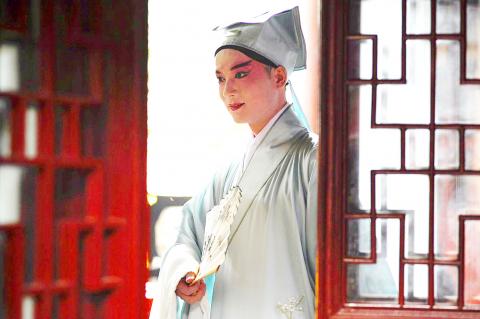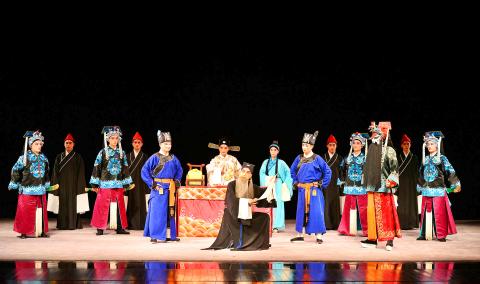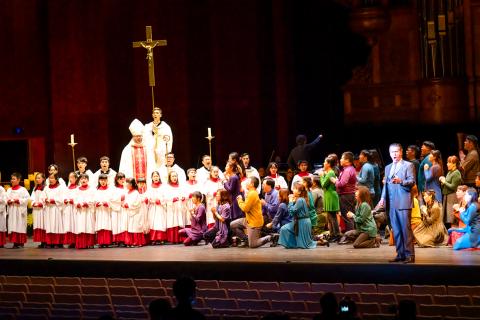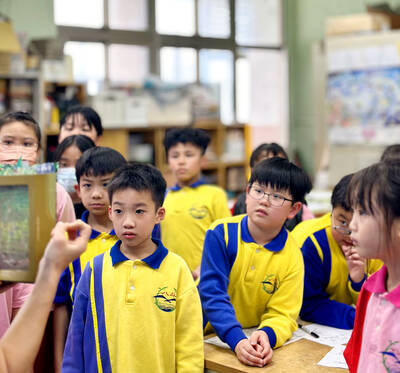Tales of passion, lust and love will be highlighted by rival performances of kun (kunqu, 崑曲) and Western opera at the National Theater and Concert Hall, as the 11th Taiwan International Festival of Arts (TIFA) enters its second weekend.
The Suzhou Kunqu Opera Theatre of Jiangsu Province (蘇州崑劇院) has returned to Taipei to perform three kun classics adapted by Taiwanese novelist and kun aficionado Kenneth Pai (白先勇), while the National Symphony Orchestra (國家交響樂團) will perform a concert version of Giacomo Puccini’s Tosca, staged by Cloud Gate Dance Theatre (雲門舞集) founder Lin Hwai-min (林懷民) and conducted by Lu Shao-chia (呂紹嘉).
KUN OPERA

Photo courtesy of Hsu Pei-hung
Pan has been in love with kun since he saw his first production of the Peony Pavilion (牡丹亭) in Shanghai when he was nine years old.
He has been credited with reviving enthusiasm for kun in Taiwan — and China — thanks to his “youth versions” of some of its major operas, starting with the Peony Pavilion at the National Theater in 2004, followed five years later by The Jade Hairpin (玉簪記).
His adaptations, which use modern theater techniques while retaining traditional kun esthetics, have won popular and critical acclaim in Taiwan, around Asia and Europe.

Photo courtesy of Hsu Pei-hung
Suzhou is considered the birthplace of kun, which originated in the 14th century during the Ming Dynasty, so it is no surprise that Pan has repeatedly turned to the city’s most famous troupe to find performers for his New Kunqu Classics Series (白先勇經典崑曲新版系列), which opens tomorrow night.
For the series, Pan has reworked The White Silk Robe (白羅衫), The Jade Hairpin and The Story of Golden Lotus (潘金蓮) to make them more accessible to modern audiences.
The White Silk Robe opens the series at the National Theater tomorrow night. It is a tale of about the estrangement of a father and son, their sins and redemption, and features Yu Jiulin (俞玖林) and Tang Rong (唐榮) in the lead roles. The show runs about two hours and 20 minutes without intermission.

Photo courtesy of National Theater Concert Hall
The Story of Golden Lotus, which will be performed on Saturday, is a tale of an extramarital love affair and a strong-willed woman determined to challenge the conventions of her feudal society, with Lu Jia (呂佳), Qu Binbin (屈斌斌) and Liu Chunlin (柳春林) in the lead roles. It runs two-and-a-half hours, with no intermission.
The Jade Hairpin, set for Sunday afternoon, is a long and complicated, but comedic tale of forbidden love between a young scholar and a Taoist nun, and stars Yu and Shen Fengying (沈豐英). It runs about 160 minutes, with a 15-minute intermission.
All three shows will be performed in Mandarin, with Chinese surtitles.
‘TOSCA’
Italian is the language of love in Lin and Lu Shao-chia’s adaptation of Puccini’s melodrama about rebels, betrayal, murder and suicide, which premiered at the National Concert Hall on Dec. 31, 2002.
Lin not only shifted the setting of the story from Rome during Napolean’s invasion of Italy to modern-day Taipei, but used the traditional Beijing opera bare-bones “table and two chairs” format to create a contemporary concert version of Tosca.
Puccini’s version tells the story of an artist, Cavaradossi, his opera singer lover, Tosca and a duplicitous police chief, Scarpia, who lusts after Tosca. Lin’s version is about an artist, his pop star lover and a Wanhua gangland godfather determined to have the singer.
The role of Tosca will be sung by two Taiwanese sopranos who were so good in the NSO’s production of Puccini’s Il Trittico in July 2017: Hanying Tso- Petanaj (左涵瀛), who will appear tomorrow night and Sunday, and Lin Ling-hui (林玲慧), who will sing on Saturday.
South Korean tenor Chung Ho-yoon will sing the role of Cavaradossi tomorrow and Sunday, with Italian baritone Lucio Gallo as Scarpia, while on Saturday those roles will be filled by Taiwanese tenor Ezio Kong (孔孝誠) and Singaporean baritone Martin Ng (吳翰衛).
Taiwanese bass Julian Lo (羅俊穎) will sing the roles of Angelotti and the jailer for all three shows, while Taiwanese baritone Chao Fang-hao (湯發凱) will be the sacristan and Sciarrone.
The stars will be supported by members of the Taipei Philharmonic Chorus (台北愛樂合唱團), the Taipei Philharmonic Children’s Chorus (台北愛樂兒童合唱團) and students from the National Taiwan College of Performing Arts (國立台灣戲曲學).
Tosca, which runs 160 minutes with intermissions, will be sung in Italian, with Chinese and English surtitles.
Next month the orchestra and cast will take Tosca to Pingtung Performing Arts Center (March 8) and the Jhongli Arts Center in Taoyuan (March 15), with Lin Ling-hui, Kong and Ng singing the lead roles.
The performances of Tosca will cap a busy week for Lin Hwai-min that began with word late on Monday from London that Cloud Gate had won the Stef Stefanou Award for Outstanding Company at Britain’s Critics’ Circle National Dance Awards for 2018 for its performances of his 2017 production Formosa (關於島嶼) at Sadler’s Wells in May.
On Tuesday he oversaw rehearsals for Tosca, today he flies to Hong Kong for the opening of Cloud Gate’s four-show run at the Hong Kong Arts Festival and he returns home tomorrow for the final lighting run-through ahead of Tosca’s first performance.
Performance Notes
WHAT: Pai Hsien-yung’s New Kunqu Classics Series
WHERE: National Theater (國家戲劇院), 21-1 Zhongshan S Rd, Taipei City (台北市中山南路21-1號)
WHEN: Tomorrow and Saturday at 7:30pm, Sunday at 2:30pm
ADMISSION: Sunday’s performance of The Jade Hairpin is sold out, while a limited number of seats are left for The White Robe tomorrow night and The Story of Golden Lotus on Saturday. Remaining tickets are NT$500 to NT$1,800, available at the NTCH box offices, online at www.artsticket.com.tw or at convenience store ticket kiosks.
WHAT: NSO Opera Concert: Tosca
WHEN: Tomorrow and Saturday at 7:30pm, Sunday at 2:30pm
WHERE: National Concert Hall (國家音樂廳), 21-1 Zhongshan S Rd, Taipei City (台北市中山南路21-1號)
ADMISSION: Remaining tickets are NT$500 to NT$1,100, available at NTCH box offices, online at www.artsticket.com.tw and at convenience store ticketing kiosks
ADDITIONAL PERFORMANCES: March 8 at 7:30pm at the Pingtung Performing Arts Center ( 屏東演藝廳-音樂廳), 4-17 Minsheng Rd, Pingtung City (屏東市民生路4-17號); tickets NT$400 to NT$1,000; and March 15 at 7:45pm at the Jhongli Arts Center (中壢藝術館), 16 Jhungmei Rd, Taoyuan (桃園市中壢區中美路16號), tickets NT$500 to NT$1,000. Tickets available online at www.artsticket.com.tw, at convenience store ticketing kiosks and at the theaters

May 26 to June 1 When the Qing Dynasty first took control over many parts of Taiwan in 1684, it roughly continued the Kingdom of Tungning’s administrative borders (see below), setting up one prefecture and three counties. The actual area of control covered today’s Chiayi, Tainan and Kaohsiung. The administrative center was in Taiwan Prefecture, in today’s Tainan. But as Han settlement expanded and due to rebellions and other international incidents, the administrative units became more complex. By the time Taiwan became a province of the Qing in 1887, there were three prefectures, eleven counties, three subprefectures and one directly-administered prefecture, with

It’s an enormous dome of colorful glass, something between the Sistine Chapel and a Marc Chagall fresco. And yet, it’s just a subway station. Formosa Boulevard is the heart of Kaohsiung’s mass transit system. In metro terms, it’s modest: the only transfer station in a network with just two lines. But it’s a landmark nonetheless: a civic space that serves as much more than a point of transit. On a hot Sunday, the corridors and vast halls are filled with a market selling everything from second-hand clothes to toys and house decorations. It’s just one of the many events the station hosts,

Two moves show Taichung Mayor Lu Shiow-yen (盧秀燕) is gunning for Chinese Nationalist Party (KMT) party chair and the 2028 presidential election. Technically, these are not yet “officially” official, but by the rules of Taiwan politics, she is now on the dance floor. Earlier this month Lu confirmed in an interview in Japan’s Nikkei that she was considering running for KMT chair. This is not new news, but according to reports from her camp she previously was still considering the case for and against running. By choosing a respected, international news outlet, she declared it to the world. While the outside world

Through art and storytelling, La Benida Hui empowers children to become environmental heroes, using everything from SpongeBob to microorganisms to reimagine their relationship with nature. “I tell the students that they have superpowers. It needs to be emphasized that their choices can make a difference,” says Hui, an environmental artist and education specialist. For her second year as Badou Elementary’s artist in residence, Hui leads creative lessons on environmental protection, where students reflect on their relationship with nature and transform beach waste into artworks. Standing in lush green hills overlooking the ocean with land extending into the intertidal zone, the school in Keelung